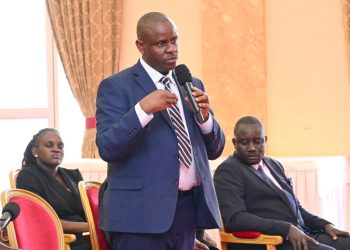The Government has finalized the formulation of the draft budget (Budget Framework Paper) for the 2019/2020 financial year, with greater priority being given to infrastructure-related projects and payment of money owed to the private sector and civil servants.
The Public Finance Management Act requires the Government to finalize the formulation of the budget framework paper before the end of December so as to allow adequate time for the various stakeholders, including Parliament, to scrutinize the budget proposals.
Works and transport to enjoy lion’s share
As it has been the case in the last 10 years, the works and transport sector will continue to take the lion’s share of the national budget. The sector’s budget will increase by sh600b, from sh4.7 trillion to sh5.3 trillion.
Budget for paying arrears expected to be doubled
In fulfillment of the promise the Government made to Parliament about plans to increase the budget for clearing domestic arrears, which according to the Auditor General’s reports are more than sh2 trillion, the budget for paying domestic arrears will be doubled from sh300b allocated in the current financial year to sh600b for the next financial year.
This will be good news for government suppliers. The Government has also separately provided sh126b for the payment of salary and pension arrears. Another sh170b is being provided for clearing part of the pensions and gratuity which will be due for payment in the 2019/2020 financial year.
Health, education budget expected to be slashed
Whereas both Parliament and various development partners have been urging the Government to increase funding for the social services sectors of health and education, money allocated to the two sectors will slightly be cut in the budget for the next financial year.
The budget for the education sector will reduce from sh2.7 trillion to sh2.6 trillion, which is a reduction of sh100b. For the health sector, the allocation is being reduced by sh100b from sh2.3 trillion to sh2.2 trillion.
This is likely to negatively impact the delivery of health services. In April 2001, the African Union countries met in Nigeria and resolved in what became to be known as the Abuja Protocol that each member country should allocate not less than 15% of the national budget to the health sector, but Uganda is allocating only 8%.
Water and environment budget to be cut
According to the Budget Framework Paper, the Government is significantly slashing funding for the water and environment sector from sh1.2 trillion to sh764b, which appears to be contrary to the declared policy of provision of water for production.
Science, technology and innovation sector budget to be trimmed
The budget for the science, technology and innovation sector is also being slashed from sh184b to sh118.9b, although the Government is stressing the promotion of science and innovations. The 2019/2020 financial year is the last financial year for the realization of the objectives the Government set in the 2015-2020 second National Development Plan (NDPII), which was expected to take the country to lower-middle-income status.
The Government had in the NDPII planned that the country’s per capita income, which is currently at $750 (about sh2.7m) will have reached $1,039 (about sh3.8m) by 2020. It also planned to have the number of people below the poverty line reduced to 14%.
Recent figures from the Uganda Bureau of Statistics indicate that the poverty rate has worsened from 19% to 21.2% currently.
Upgrading of roads
Road projects planned to commence in the 2019/2020 financial year include upgrading of LuweroButalangu road (29km), Muyembe-Nakapiripirit road (92km), Rwenkunye-ApacAcholibur road (191km), construction of Busega-Mpigi Expressway (32km), KampalaJinja Expressway (95km), designing and building of Najjanankumbi-BusabalaMunyonyo spur interchange and service roads (11km), designing plus the building of Kira-Matugga road (22km) as well as the improvement of five junctions in Kampala, construction of Nakaseke-Singo road (26km) and Migyera-Kafu road (20km).
National roads
The Government plans to construct 400km of national roads, rehabilitate 332.4km of national roads, construct 58 bridges and acquire 1,250 hectares of land for right of way.
Energy budget increased
The energy sector will also have its budget increased by over sh200b from sh2.4 trillion to sh2.6 trillion next financial year.
Military hospital in offing
In the security sector, the key priority projects for implementation will include construction of the military referral hospital, barracks construction, and construction of the National Defence College Uganda.
Agriculture inputs to be procured in next budget
For agriculture, which is the backbone of the economy, the Government plans to procure and distribute 162 tractors and matching implements, 200 lower-level mechanization (ox ploughs, power tillers), 130 solar water pumping systems and construct 10 community grain stores.
It will also provide 1,400 moisture meters, 1,400 rice hullers, 1,400 driers and 1,400 weighing machines to farmer groups involved in the production of cereal crops in the major maize and rice growing hubs.
Revenue collection plans
Domestic revenue collection mostly from taxes is projected to increase from sh16.4 trillion set for the current financial year to sh18.3 trillion in the next financial year.
This, according to the Budget Framework Paper, will be supported by revenue administration measures, enhanced efficiency in tax collections as well as the implementation of the medium term Domestic Revenue Mobilization Strategy.
The projected increase in domestic revenue will lead to a rise in the percentage of the budget financed by domestic resources from the 64.2% target for the current financial year to 67.9% in the 2019/2020 financial year.
Explaining where the more than sh2 trillion additional revenue will come from, the commissioner for tax policy, Moses Kaggwa, said:
“As you may have noticed, every year there is an addition in revenue collection of about sh1 trillion arising from the growth of the economy. The other portion will come from improved administrative and policy measures.”
Asked what exactly he meant by policy measures, Kaggwa said:
“There can be an increase in the rate of some taxes provided Parliament approves it.”
The commissioner also said Uganda Revenue Authority had been tasked with improving its systems to ensure more tax revenue is realized from those who may have been under declaring or dodging taxes.
| 2019/2020 Budget allocations
(Ush, billion And Percentage share) |
||||
| SECTOR ALLOCATIONS | 2018/19 | % | 2019/20 | % |
| Works and Transport | 4,786.6 | 19.1% | 5,316.9 | 20.8% |
| Interest Payments | 2,514.1 | 10.0% | 2,913.6 | 11.4% |
| Education | 2,781.1 | 11.1% | 2,685.4 | 10.5% |
| Energy and Mineral
Development |
2,438.2 | 9.7% | 2,662.9 | 10.4% |
| Health | 2,310.1 | 9.2% | 2,278.4 | 8.9% |
| Security | 2,068.0 | 8.2% | 1,944.4 | 7.6% |
| Public Sector Management | 1,577.7 | 6.3% | 1,615.8 | 6.3% |
| Justice/Law and Order | 1,296.1 | 5.2% | 1,395.1 | 5.5% |
| Accountability | 1,123.7 | 4.5% | 1,209.3 | 4.7% |
| Agriculture | 892.9 | 3.6% | 919.8 | 3.6% |
| Water and Environment | 1,265.8 | 5.0% | 764.5 | 3.0% |
| Public Administration | 624.1 | 2.5% | 746.4 | 2.9% |
| Legislature | 497.8 | 2.0% | 497.8 | 1.9% |
| Social Development | 214.7 | 0.9% | 162.8 | 0.6% |
| Science, Technology and
Innovation |
184.0 | 0.7% | 118.9 | 0.5% |
| Lands, Housing and Urban
Dev’t |
202.4 | 0.8% | 113.8 | 0.4% |
| Trade and Industry | 134.1 | 0.5% | 86.7 | 0.3% |
| ICT & National Guidance | 149.1 | 0.6% | 79.5 | 0.3% |
| Tourism | 32.6 | 0.1% | 32.4 | 0.1% |
| SUB TOTAL | 25,093.23 | 100.0% | 25,544.61 | 100.0% |
| * Memo Items | ||||
| External Debt Repayments
(Amortisation) |
894.05 | 650.11 | ||
| Domestic Refinancing | 5,271.50 | 6,020.00 | ||
| Domestic Arrears | 380.50 | 600.00 | ||
| Gratuity FY 2019/20 | 170.67 | |||
| Shortfalls in Salaries, Pensions and Gratuity |
126.75 |
|||
| Appropriation in Aid (AIA) | 1,063.54 | 1,192.55 | ||
| GRAND TOTAL | 32,702.82 | 34,304.70 | ||






























































